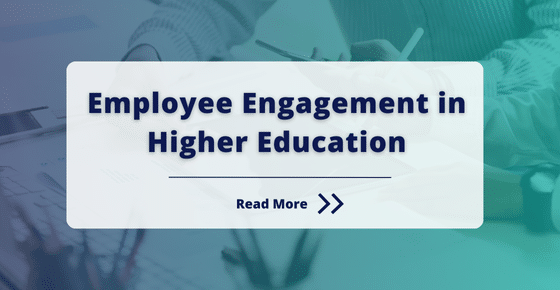Strategy
Employee Engagement in Higher Education

Research indicates that the overall turnover rate in the higher education sector is at 14% for the 2023-2024 period. This poses a significant concern, as losing experienced staff can disrupt the student experience and incur hefty recruitment costs.
Improving employee engagement is one of the most effective ways to mitigate turnover. This guide explores some strategies for human resources (HR) teams to boost higher education employee engagement, ultimately helping you drive growth in your university or college.
What Is Employee Engagement in Higher Education?
Employee engagement in the higher education sector refers to how invested university or college staff are in their jobs. High levels of enthusiasm and dedication toward tasks are often indicators of good engagement.
A highly engaged workforce has many benefits for institutional success. For example, faculty and other staff members are more likely to be more productive, absent less often and pivotal in creating a positive work culture. These benefits culminate in a better student experience, helping your institution stand out from the rest.
Key Factors Influencing Employee Engagement
Employees are often most engaged when they start a new role — yet their enthusiasm may dwindle over time. Here’s an overview of some of the factors that impact employee engagement.
Work-Life Balance
Higher education staff have lives outside of the classroom. Institutions prioritizing a healthy work-life balance show respect for their employees’ time and interests. In return, employees are invariably more committed and motivated to take on new tasks.
HR teams can ensure a better work-life balance by regularly assessing employees’ workloads and providing additional resources if necessary. Institutions that allow greater flexibility also help staff manage their work and personal commitments. For example, they could organize the teaching timetable to allow faculty members with children to complete the school drop-off or offer remote teaching opportunities for staff far away from the campus.
Faculty Motivation
Faculty motivation refers to the collective energy and commitment staff show in their roles. When staff feel motivated, they’re likely to deliver more engaging lessons and seek opportunities to expand their knowledge.

Universities and colleges can motivate employees by providing opportunities for advancement and better benefits. In addition, establishing a positive work culture will boost team morale and help employees feel excited about coming to work each day.
Assessing Employee Engagement
HR and higher education staff may have different perspectives on overall employee engagement. Surveys help to provide a more accurate view. Here’s an overview of how to create an employee engagement survey for higher education:
- Define the objectives: Determine what your institution wants to assess, such as job satisfaction or inclusivity. Involve relevant stakeholders in this decision.
- Select appropriate questions: Once you’ve defined your overall goal, you can formulate your questions. Combining open-ended and Likert scale-based questions will help you gain a comprehensive understanding of engagement.
- Administer the survey: Decide if you will allow anonymous responses, and administer the survey accordingly. Set a deadline for responses to ensure everyone knows how long they have to provide feedback.
- Analyze the data: Gather the responses, and use the appropriate methods to interpret the data. Note any trends and or areas of improvement.
- Design an action plan: Armed with the relevant data, you can devise a strategy to address any areas affecting employee engagement. Set a date to review your progress and celebrate any achievements.
Strategies to Increase Employee Engagement
Whether you’re trying to curb turnover or boost productivity levels, improving employee engagement is often the solution. Here are some of the most effective employee engagement ideas in higher education for HR teams to implement.
Leadership Development
Higher education leaders play a fundamental role in influencing employee behavior. HR can support leaders in driving better engagement by providing training that focuses on the following:
- Communication: When teams communicate effectively, they reduce workplace conflict and boost collaboration. Leaders who take the time to understand communication styles are more equipped to communicate with employees in a way that resonates with them.
- Interpersonal skills: Employees are human and sometimes require empathy and patience. Programs that build interpersonal skills help leaders understand staff better, making them feel valued in the workplace.
- Coaching: Equipping leaders with coaching skills helps them encourage their teams to pursue professional goals. Employees who see the value of growing in their role will typically be more engaged.
Diversity and Inclusion
One of the core learning areas for higher education students is critical thinking. Employing a diverse faculty supports this learning area as students will benefit from various perspectives. Some ways in which HR teams can help create a more inclusive environment include:
- Establish a DEI statement: A diversity, equity and inclusion (DEI) statement articulates an institution’s commitment to achieving these goals. An effective statement will help employees feel more comfortable in who they are, enabling them to feel confident interacting with others.
- Conduct interviews or focus groups: The best way to determine if your university or college supports diversity or inclusion is to ask your staff. Arranging focus groups or interviews helps to solicit this feedback.
- Provide training: Sometimes, employees are unaware of the stereotypes or biases they hold. Providing training helps to educate staff on how to be more inclusive, ultimately leading to an environment where people feel free to voice their opinions.
HR Strategies
HR teams are instrumental in boosting employee engagement. They do this by creating practices and policies that support staff from their induction into the company through to exit.
While your institution may have the necessary policies and practices in place, it’s worth reviewing and updating them periodically. Finding instances where you can make job descriptions more inclusive and remove unconscious bias will positively affect engagement.
Supporting Employee Well-Being
The United States Centers for Disease Control and Prevention (CDC) reveals that 1 in 25 adults experience a mental illness. These stats suggest that there’s a high chance some of your employees are battling with an issue and need extra support.
Higher education institutions can help break the stigma around mental diseases by recognizing and addressing these health challenges. In addition, they can provide the resources employees need to address mental illnesses and ultimately become more engaged in the workspace.
Professional Development
One reason employees left their jobs during the “Great Resignation” was a lack of opportunities for advancement. Higher education institutions that provide additional training or financial support to continue their studies help to ensure a happier and more engaged workforce.
In addition, employees who gain additional skills will be eligible for promotion. Creating opportunities to grow within a company helps to boost engagement, as staff feel their efforts will have more impact.
Enhancing Performance and Recognition
Every time an employee exceeds key performance indicators (KPIs) or goes the extra mile to ensure a better student experience, it’s worth celebrating. Marking these efforts shows that your institution acknowledges the extra work staff put in daily.
Hosting appreciation services or offering monetary awards helps to incentivize further great work. Involving team members in these processes also helps to boost morale.
Performance Management
A final strategy to ensure better workplace engagement is implementing performance evaluation and feedback mechanisms. While annual reviews are helpful, scheduling more frequent feedback sessions can have a greater impact.
HR can help provide criteria to measure performance more effectively so rewards offer more value. If performance areas reveal areas for growth, they can also instigate training to help bridge the gap.
Improve Employee Engagement in Higher Education With Exude Human Capital
It’s clear higher education centers benefit from retaining high-level faculty and student support staff. However, HR sometimes requires additional strategies to ensure employees are engaged and energized to complete the work.
Exude Human Capital specializes in assisting HR staff in opening employee minds and driving innovation. Gaining the resources you need to achieve this goal helps you deliver a better employee and student experience, ultimately putting your organization ahead of the competition. If you’re looking for tailored engagement solutions, contact our team today! We’ll work with you to create a more engaged, positive and productive faculty and student support team.








